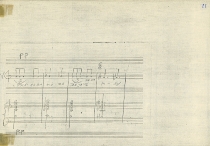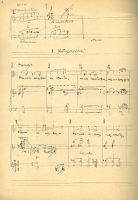Five Songs to words by Konstanty Ildefons Gałczyński for soprano and piano (1956/86)
Written in 1956, Tomasz Sikorski’s Five Songs to words by Konstanty Ildefons Gałczyński are youthful pieces. Yet they are commonly but wrongly dated to 1986. This was caused by Sikorski’s precarious financial situation owing to which he decided to sell the work to PWM Edition. He hurriedly copied the score, into which he introduced merely cosmetic changes, and wrote on it the date of the making of the new score and not of the writing of the songs.
The titles of the songs in the cycle are: Cemetery, Night I, A lullaby, Night II and So simple. The lyrics are made up of Gałczyński’s poems or excerpts from them, written in 1945 and 1946: [I know there is a cemetery...], Night (Night I and Night II), [Almost everything has happened...] and [So simple…]
The lyrics of the songs are as follows:
Cemetery:
I know there is a cemetery. Perhaps in heaven or by the harbour, where all wandering ends. There is an inscription about my heart: ‘It beat only for you’...It followed you in the sun, in despair, it waited for you by each gate – it was always like this.
Night I:
A frightful, frightful night, the wind shaking the trees, the night is so wheezing, the night is so hot, love runs under the bark, love runs over the leaves and the birds lose their feathers like I lose my manuscripts. Because the night is there, the night is like a waltz.
A lullaby:
Almost everything has happened what was meant to happen, it won’t hide from the earth or heaven – now sleep, my little one, just sleep, you need to sleep, so don’t wake up.
Night II:
To the bridge, run to the bridge, ah, hold on to the bouquet, so that the wind won’t snatch it from you. Your name is of emerald. The wind moves your hair – I know its secret alphabet, lines of rings and locks, and curls. The dawn is still far away. Can you hear the night flowing? I rings like old clocks on the towers of submerged towns – your name is of the wind.
So simple:
So simple and so terrible – there was a small lock by the ear, then there was tenderness and more tenderness, and so began a love night.
It is worth noting that already in this youthful composition we find themes that would recur in Sikorski’s later works: death, wandering, despair, loneliness, night (darkness, twilight, penumbra). We may wonder at how much sadness there is in this piece composed by an eighteen-year-old. The songs are a painful illustration of the young composer’s experiences associated with e.g. the tragic death of his mother; they also are a cruel presage that will fill his life.
There is a telling fragment in Night I, mentioning manuscripts. We cannot help but get the impression that Sikorski projects here future events from his life. As the records of the PWM Library in Warsaw tell us, between 1975 and 1983 Sikorski borrowed manuscript scores of his works several times – usually under the pretext of making some corrections. However, the scores were never returned by the composer. Whether this was deliberate, a sign of doubt in the value of his oeuvre, or whether it was mere absent-mindedness – it is hard to say.
What is symptomatic of the song cycle in question is the subject of love – unfulfilled, difficult, wild, even mystical. We can clearly sense here a longing for genuine, passionate affection and – like in A lullaby– mother’s care. The last song, especially its ending ‘And so began a love night’, suggests that happiness has been achieved. Yet the joyful finale seems to be played only in a dream. The reality continues to reveal cold emptiness.
The musical language of Songs is very different from what was characteristic of Sikorski’s later works – lining up of modules based on persistently repeated chords or short motifs. We are dealing here with a clear narrative: the melodic line of the voice is supported by the piano accompaniment and the whole skilfully corresponds to the text. The piece is written down by means of the traditional bar notation, though the constantly changing metre, as well as untypical markings like 9/16, 7/8 or 11/16, make it impossible to link the music to a specific pulse. The songs seem to be a freely flowing stream of sounds and words.







